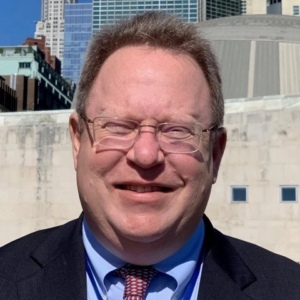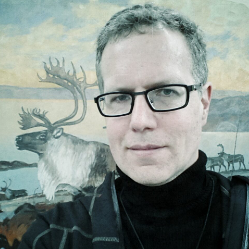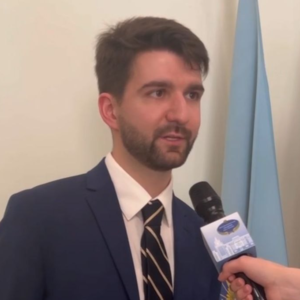Unfrozen: Global Competition in the Arctic
Virtual Briefing Series
Tuesday, February 13th, 2024 | 12:00 PM – 1:00 PM ET
The Arctic has become an increasingly active geopolitical battleground for the United States, Russia, and China. Thawing ice caused by climate change opens the possibility of the region becoming a global shipping lane, potentially transforming international trade. China, although not an Arctic nation, has stepped up efforts to expand its presence in the area, creating new opportunities to enforce its interests abroad. The Arctic Council, previously a positive and active body for the region, has not met since Russia’s second invasion of Ukraine, reducing international dialogue over the region. Meanwhile, the United States is in the process of increasing its local military deterrent. What are the interests of China, Russia, and the US in the area and how is each working to achieve them? How will climate change affect how nations act towards the Arctic? What will NATO expansion mean for the security of the region?
Join us on Tuesday, February 13, 2024, from 12 PM to 1 PM ET for a virtual discussion with Evan Bloom, Senior Fellow at the Polar Institute at the Wilson Center, Dr. Marc Lanteigne, Associate Professor of Political Science at the Arctic University of Norway, and Pavel Devyatkin, Senior Associate at the Arctic Institute.
COULDN’T ATTEND OUR EVENT? Don’t worry. You can watch it below
SPEAKERS:
Evan Bloom
 A lawyer and senior diplomat, Mr. Evan Bloom joined the Wilson Center as a Senior Fellow in January 2021. He was one of the U.S. Government’s foremost experts on Arctic and Antarctic governance and foreign policy, as well as oceans policy. During his nearly thirty years at the Department of State, Mr. Bloom served as Acting Deputy Assistant Secretary of State for Oceans and Fisheries (8/2019 to 9/2020) and Director of the Office of Ocean and Polar Affairs (1/2010 to 12/2019 and 9/2020 to 12/2020).
A lawyer and senior diplomat, Mr. Evan Bloom joined the Wilson Center as a Senior Fellow in January 2021. He was one of the U.S. Government’s foremost experts on Arctic and Antarctic governance and foreign policy, as well as oceans policy. During his nearly thirty years at the Department of State, Mr. Bloom served as Acting Deputy Assistant Secretary of State for Oceans and Fisheries (8/2019 to 9/2020) and Director of the Office of Ocean and Polar Affairs (1/2010 to 12/2019 and 9/2020 to 12/2020).
He led U.S. Antarctic policy as head of the U.S. delegations to the annual Antarctic Treaty Consultative Meetings and the Commission for the Conservation of Antarctic Marine Living Resources from 2006 to 2020. He also served as the lead U.S. negotiator for the successful establishment of the world’s largest marine protected area, in Antarctica’s Ross Sea. He led four official inspections of foreign facilities in Antarctica.
With regard to the Arctic, he helped establish the Arctic Council, negotiating its initial rules and documents in 1996. He supervised U.S. representation in the Council from 2006 to 2020. He co-chaired the Council’s task force that produced the eight-party Agreement on Arctic Science Cooperation in 2017. He also co-chaired the Council’s Ecosystem-Based Management Experts Group.
He led the U.S. delegation to high seas treaty negotiations (biodiversity beyond national jurisdiction) at the UN from 2016-2020. He chaired the Executive Committee of the federal Extended Continental Shelf Task Force and supervised State Department representation at the International Maritime Organization and the International Seabed Authority. He led U.S. delegations to numerous law of the sea bilateral and multilateral dialogues and served as the State Department’s representative to the White House Ocean Policy Committee.
During his tenure in the State Department Office of the Legal Adviser, he was a member of the U.S. delegation to the United Nations (Sixth Committee, Committee on Sustainable Development, Committee on the Status of Women), and was a U.S. negotiator on delegations related to the Kyoto Protocol on climate change, the World Summit on Sustainable Development and the Fourth World Conference on Women. In addition, he specialized in space law (including as negotiator for agreements related to the International Space Station and global navigation systems) and international humanitarian law. He also served as Counsel to the State Department’s Inspection General and was a member of the federal Senior Executive Service.
Mr. Bloom is a Member of the Council on Foreign Relations and a Fellow of the Explorers Club. He received the Commandant’s Distinguished Public Service Medal from the U.S. Coast Guard in 2020 and the U.S. Antarctica Service Medal in 2007. He holds degrees from Princeton University (A.B.) and Columbia Law School (JD). Prior to his government service, he was in private practice in Tokyo and Washington, DC.
Dr. Marc Lanteigne
 Marc Lanteigne is an Associate Professor in Political Science at the Arctic Institute of Norway, where he teaches courses covering international relations, comparative politics, security studies, and comparative political economy. He specializes in the foreign and domestic politics of China as well as the international relations and non-traditional security of Northeast Asia/Russian Far East, Europe and the polar regions.
Marc Lanteigne is an Associate Professor in Political Science at the Arctic Institute of Norway, where he teaches courses covering international relations, comparative politics, security studies, and comparative political economy. He specializes in the foreign and domestic politics of China as well as the international relations and non-traditional security of Northeast Asia/Russian Far East, Europe and the polar regions.
Lanteigne is also an Adjunct Researcher at Ruhr University Bochum in Germany, where he deals with the analytical and practical dimensions of natonal and regional policies in East Asia.
He has previously served as a Lecturer at several universities around the world, including at the Centre for Defence and Strategic Studies at Massey University in New Zealand, Peking University in Beijing, and Victoria University of Wellington. He worked as a Senior Researcher at the Norwegian Institute of International Affairs and as a Director of Research at the New Zealand Contemporary China Research Centre.
Lanteigne received his Ph.D. in Political Science and Government from McGill University.
Pavel Devyatkin
 Pavel Devyatkin is a Senior Associate at The Arctic Institute in Washington and a PhD Fellow and Lecturer at HSE University in Moscow. He has written research on Russia’s Arctic strategy and foreign policy for international think tanks, the US Department of Defense, and peer-reviewed journals. He has presented at conferences in the US, Russia, Norway, China, UK and Japan.
Pavel Devyatkin is a Senior Associate at The Arctic Institute in Washington and a PhD Fellow and Lecturer at HSE University in Moscow. He has written research on Russia’s Arctic strategy and foreign policy for international think tanks, the US Department of Defense, and peer-reviewed journals. He has presented at conferences in the US, Russia, Norway, China, UK and Japan.
Pavel Devyatkin is a Senior Associate and Leadership Group member at The Arctic Institute and a PhD Fellow and Lecturer at HSE University in Moscow. His research areas include Russian Arctic policy, U.S.-Russia and U.S.-China relations, international cooperation, governance, security, and diplomacy. Pavel’s analyses of Arctic affairs have been published by the U.S. Department of Defense, think tanks, and peer-reviewed journals.
He has presented at conferences in the US, Russia, Norway, China, UK and Japan. Pavel was previously Editor in Chief and a contributing writer of The Arctic This Week and Manager of The Arctic Institute’s 10-Year Anniversary Program.
Pavel is also a Research Fellow at the Stanford U.S.-Russia Forum and a Visiting Lecturer and Researcher at the Higher School of Economics in Moscow (HSE), where he teaches strategic studies and manages a working group on Russian security strategy.
Pavel graduated from the London School of Economics (LSE) and University College London (UCL). He previously worked as a researcher at the United Nations (UNCCD) and development organizations including the Global Landscapes Forum and the Sustainable Development Innovation Lab (UNLEASH). Pavel is an American of Russian ancestry.
JOIN US!
We are trying our best to keep our community informed about foreign affairs, and we would appreciate if you can support us to keep this virtual briefing series going. No amount is too small.

